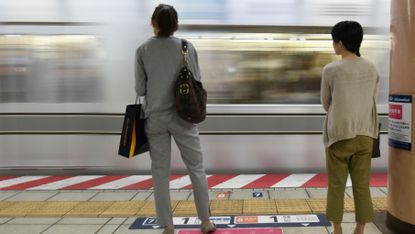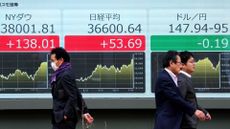What is Japanification?
Economists fears challenges posed by coronavirus pandemic may push Europe into Japan-like crash

Fears are growing that the economic downturn and record deflation triggered by the coronavirus outbreak may trigger the so-called “Japanification” of the eurozone.
The term is used as shorthand for the economic problems that crippled Japan around the turn of the millennium.
What happened in Japan and could Europe go the same way?
Subscribe to The Week
Escape your echo chamber. Get the facts behind the news, plus analysis from multiple perspectives.

Sign up for The Week's Free Newsletters
From our morning news briefing to a weekly Good News Newsletter, get the best of The Week delivered directly to your inbox.
From our morning news briefing to a weekly Good News Newsletter, get the best of The Week delivered directly to your inbox.
Around 20 years ago, Japan was hit by “weak rates of growth and persistently low rates of inflation despite huge amounts of policy support, particularly from central banks”, explains Neil Shearing of London-based research consultancy Capital Economics.
The Telegraph reports that “economists have long feared that the eurozone is heading into a state of Japanification where it cannot escape a period of stagnation, defined by weak growth, ultra-loose monetary policy and deflationary pressures”.
Deflation can cause people to stop spending, in the expectation that prices will fall lower in future, and can also hurt employers if wages do not fall with prices.
This increases the pressure on the economy and “can cause a vicious cycle”, the newspaper says.
How great is the risk facing the eurozone?
Experts say the coronavirus outbreak is resulting in economic damage that poses the greatest risk faced by the eurozone since the 2008 financial crash.
From a “big-picture perspective”, the pandemic “has once again brought the structural issues of debt, demographics and disinflation to the fore”, Morgan Stanley economists warned in mid-March, as the Los Angeles Times reported at the time.
Days later, the European Central Bank (ECB) launched an emergency €750bn (£660bn) package to ease the impact of the coronavirus pandemic. ECB boss Christine Lagarde tweeted that there were “no limits” to the bank’s commitment to the euro.
Europe is not alone in taking extraordinary measures to try to mitigate risk. The US Federal Reserve last month announced that it was cutting interest rates to near zero and buying at least $700bn (£570bn) of Treasury and mortgage-backed securities in a bid to boost the economy.
“We’re essentially at the Japanese place,” former treasury secretary Larry Summers said during an interview with Bloomberg Television. “That’s a place that’s very hard to get out of.”
David Mann, chief economist for Standard Chartered Plc in Singapore, told the network to “think of things like helicopter drops” - central banks printing cash and delivering it straight to the public - “think of things like fiscal deficits that could be partially directly monetised by central banks”. This new toolkit will be needed “not just during this shock, but during the 2020s”, Mann warned.
–––––––––––––––––––––––––––––––For a round-up of the most important stories from around the world - and a concise, refreshing and balanced take on the week’s news agenda - try The Week magazine. Start your trial subscription today–––––––––––––––––––––––––––––––
How is Japan’s economy doing now?
“Not all that bad,” says Capital Economics’ Shearing. Japan’s GDP has risen by an average of 1.3% a year over the last decade, while overall employment has never been higher.
“Predictions of an impending fiscal catastrophe caused by a large and rising government debt burden have (so far) proved to be unfounded,” Shearing adds.
However, the high employment rate in the East Asian nation has led to wage growth stagnating, and putting more people to work without creating more work to go around has seen productivity fall.
And inflation remains stuck at very low levels, despite “super-loose” monetary policies from Bank of Japan.
Create an account with the same email registered to your subscription to unlock access.
Sign up for Today's Best Articles in your inbox
A free daily email with the biggest news stories of the day – and the best features from TheWeek.com
-
 Ottawa climate talks: can global plastic problem be solved?
Ottawa climate talks: can global plastic problem be solved?In the spotlight Nations aim to draft world's first treaty on plastic pollution, but resistance from oil- and gas-producing countries could limit scope
By Harriet Marsden, The Week UK Published
-
 Netherlands split on WFH for sex workers
Netherlands split on WFH for sex workersSpeed Read Councils concerned over 'nuisance' of at-home sex work, but others say changes will curb underground sex trade
By Arion McNicoll, The Week UK Published
-
 'He adored Trump, and then rejected him'
'He adored Trump, and then rejected him'Today's Newspapers A roundup of the headlines from the US front pages
By The Week Staff Published
-
 Japan is no longer the world's third-biggest economy despite its stock market peaking
Japan is no longer the world's third-biggest economy despite its stock market peakingTalking Point The country was overtaken by Germany after unexpectedly entering a recession
By Justin Klawans, The Week US Published
-
 Inflation vs. deflation: which is worse for national economies?
Inflation vs. deflation: which is worse for national economies?Today's Big Question Lower prices may be good news for households but prolonged deflation is ‘terrible for the economy’
By The Week Staff Published
-
 Eurozone economy shrinks at record rate
Eurozone economy shrinks at record rateSpeed Read Fears of deep recession piles pressure on EU governments to agree trillion-euro bailout programme
By The Week Staff Last updated
-
 Carlos Ghosn defends himself in public
Carlos Ghosn defends himself in publicIn Depth The world has been waiting to hear from the fugitive businessman, and on a stormy night in Beirut, he delivered his impassioned defence
By William Gritten Last updated
-
 Will ECB stimulus be enough to revive the eurozone?
Will ECB stimulus be enough to revive the eurozone?Speed Read European Central Bank cuts key rate, and announces it will re-initiate quantitative easing
By The Week Staff Last updated
-
 Europe facing another ‘lost decade’
Europe facing another ‘lost decade’Speed Read Ten years after the financial crisis, economic stagnation risks becoming the new normal
By Elliott Goat Last updated
-
 ECB chief U-turns on eurozone stimulus
ECB chief U-turns on eurozone stimulusSpeed Read Mario Draghi admits ‘additional stimulus will be required’ if the economic outlook for the stuttering region does not improve
By The Week Staff Last updated
-
 Why Japanese women are taking a stand against high heels
Why Japanese women are taking a stand against high heelsSpeed Read Social media campaign against dress codes and expectations that women wear high heels at work has gone viral
By The Week Staff Last updated